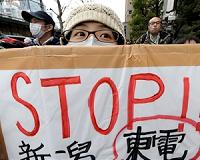 |
Delft, Holland (SPX) May 09, 2011 The recent nuclear accident in Fukushima Daiichi in Japan has brought the nuclear debate to the forefront of controversy. While Japan is trying to avert further disaster, many nations are reconsidering the future of nuclear power in their regions. A study by Behnam Taebi from the Delft University of Technology, published online in the Springer journal Philosophy and Technology, reflects on the various possible nuclear power production methods from an ethical perspective: If we intend to continue with nuclear power production, which technology is most morally desirable? On the one hand, nuclear power has serious disadvantages: accident risks (the unfolding disaster in Japan speaks for itself), security concerns in relation to the proliferation of nuclear weapons, and the problem of long-lived waste. On the other hand, nuclear power technologies can produce large amounts of energy from small amounts of fuel, while emitting very low amounts of greenhouse gases. They reduce countries' reliance on fossil fuel for their energy provision. So nuclear power has increasingly attracted attention in recent years especially in conjunction with the growing worldwide demand for energy and the mounting climate change concerns. Including the state of the art in technology in his philosophical analysis, the author combines philosophical discussions on justice between generations and technological realities of nuclear power production. In an attempt to assist the public and political decision-makers in understanding what is at stake when they opt for a specific kind of nuclear production method, and making technically and ethically informed choices, the author compares different nuclear energy production methods on the basis of moral arguments. Dr. Taebi said, "Discussions on nuclear power usually end up in a yes/no dichotomy. Meanwhile the production of nuclear power is rapidly growing. Before we can reflect on the desirability of nuclear power, we should first distinguish between its production methods and their divergent ethical issues. We must then clearly state, if we want to continue on the nuclear path, which technology we deem desirable from a moral perspective. "Then we can compare nuclear with other energy systems. The state of the art in nuclear technology provides us with many more complicated moral dilemmas than people sometimes think." The article is part of a special issue of the Springer journal Philosophy and Technology, dedicated to energy technologies, and risks and causality theories. It includes an editorial on metatechnological approaches to risks in the energy industry and commentaries on attitudes toward nuclear radiation and on the emotional debates surrounding nuclear energy.
Share This Article With Planet Earth
Related Links - Nuclear Power News - Nuclear Science, Nuclear Technology Powering The World in the 21st Century at Energy-Daily.com
 Thousands rally in Japan against nuclear power
Thousands rally in Japan against nuclear powerTokyo (AFP) May 7, 2011 Thousands of people rallied in Japan Saturday to demand a shift away from nuclear power after an earthquake and tsunami sparked the world's worst atomic crisis since Chernobyl a quarter-century ago. Braving spring drizzle, thousands of demonstrators gathered at a park in Tokyo's Shibuya district, many holding hand-made banners reading: "Nuclear is old!" and "We want a shift in energy policy! ... read more |
|
| The content herein, unless otherwise known to be public domain, are Copyright 1995-2010 - SpaceDaily. AFP and UPI Wire Stories are copyright Agence France-Presse and United Press International. ESA Portal Reports are copyright European Space Agency. All NASA sourced material is public domain. Additional copyrights may apply in whole or part to other bona fide parties. Advertising does not imply endorsement,agreement or approval of any opinions, statements or information provided by SpaceDaily on any Web page published or hosted by SpaceDaily. Privacy Statement |